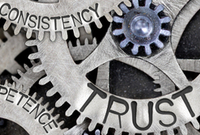 In the second part of this series exploring trust and leadership, Elizabeth Stewart, Head of Executive Assessment and Development at global executive search specialists, Odgers Berndtson, suggests how leaders can create that most valuable of personal assets: trust.
In the second part of this series exploring trust and leadership, Elizabeth Stewart, Head of Executive Assessment and Development at global executive search specialists, Odgers Berndtson, suggests how leaders can create that most valuable of personal assets: trust.
Investing in trust
As we emerge from this global crisis, leaders need to take stock of the level of their trustworthiness to refresh how and where they personally invest themselves.
Creating the trustworthiness which fosters confidence in others is a dynamic, relational activity. It needs constant awareness through engagement with key stakeholders and regular adjustment.
Given the diversity of others’ mindsets, personalities and expectations, trust is a complex dimension of leadership – and often underinvested in.
What can leaders do?
Use the trust equation mentione in the previous article to create a trust index. Prioritise it in their self-reflection – am I trustworthy?
So, a leader might:
- Commit: set the trust index as a personal KPI.
- Define: for each factor clarify what it means to them and how they evidence it.
- Evaluate: consider how trustworthy they are to different stakeholders.
- Explore: check out their perceptions of each factor with what it means to key stakeholders.
- Adjust: determine what can be strengthened and invest in the changes that raise the index.
- Attend: take regular feedback on the trust index with key stakeholders to determine the extent and depth of followership.
What about others in the organisation?
A global survey on Leadership Confidence of around 1800 global executives and senior managers (November, 2019) indicate that although CEOs and C-Suite leaders are vital to the future success of organisations through disruptive times there was a 15 point gap in the confidence in their individual capability. This study reinforced that high performing teams and constructive alliances between internal stakeholders were vital to embrace the complexity and pace of future evolution successfully.
These leaders will only be as strong as the collaborations below them so it is vital leaders considers the trustworthiness with other stakeholders in the organisation and beyond. Is he/she (critical partners, collaborators, allies) trustworthy?
So, you might:
- Map: determine the key internal or external stakeholders whose followership, contribution and collaboration are critical to deliver not just business success but to release exceptional performance.
- Evaluate: using the Trust Equation, determine where trust is strong and what needs to be changed to release the best in others.
- Address: with others explore which factors cause a drag on their trustworthiness. This often requires courage to instigate and follow-through on difficult, honest conversations and on issues of emotions, behaviours and values.
- Follow-through: invest time with others on their trust journey, providing safe-support and regular, constructive feedback.
Trust is basis for high performance.
Research shows that high-performing teams can deliver 20% additional economic value. A foundation of trust within the team is essential. So, leading the team’s evaluation of the strength of the collective trust index will:
- Determine the individuals who are strong pillars and the collaborations which are yielding additional value for the organisation.
- Encourage individuals to invest in raising their trustworthiness and building more trust in partnerships.
- Embed the trust index as an individual and team KPI, where progress should be surveyed regularly.
The prize of pursuing the building of trust in the leadership is the ripple effect down through an organisation, and across internal and external boundaries, which delivers outstanding results.
The effort to sustain trust requires perseverance from leaders with the mindset, values and a commitment to develop new behaviours. Is it worth it?
The value of trustworthiness.
“To be trusted is a greater complement than being loved” (George Macdonald). So the journey starts with a challenge to the very essence of who we are. And the real and sustained value is who we become.
A leader seeking to build trust with, and between others, demonstrates a commitment to the greater good. For no greater love has a man or a woman than when they lay down their self-interest on behalf of others.
These are the leaders who are remembered after they move on and create a sustained impact because others seek to build on their legacies and emulate their leadership style.

 In the second part of this series exploring trust and leadership,
In the second part of this series exploring trust and leadership, 